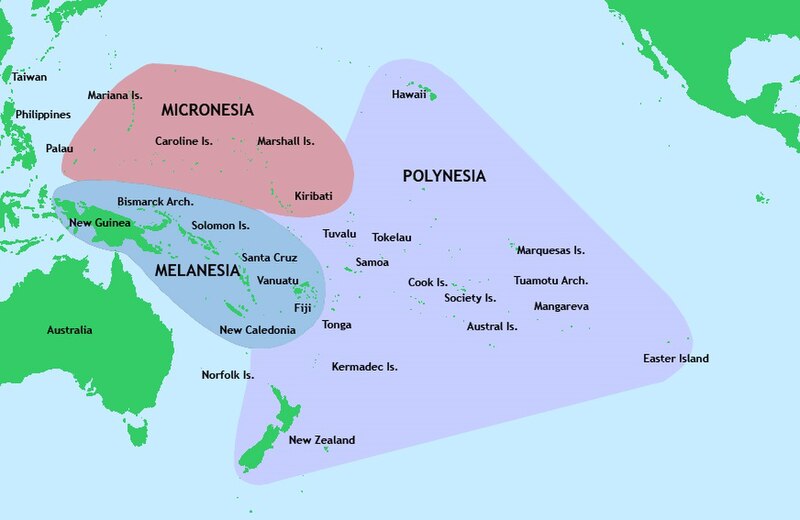Language and Oral Tradition: Music and Dance of the Kanak
Wade Davis, Explorer for National Geographic, stated: "a language is not just a body of vocabulary or a set of grammatical rules: a language is a flash of the human spirit, it's the vehicle through which the soul of each particular culture comes into the material world." Nowhere is the soul of a particular culture more manifest than through the music and dance of that culture.
 |
| New Calednoia is the Home of the Kanak Peoples |
Pertaining to War
The rhythmic sounds of song and dance were interwoven into important tribal events: preparation for war is a prime example. Learning to dance was an important part of Kanak warfare. Not that they had dance battles, or anything. During battle, Kanak warriors avoided the spears and the arrows of their enemies by relying on agile, rhythmic motions they learned through their culture of dance. In fact, the various tribes of the Kanak would never leave for war without first holding a war dance in which they showed off their skill and agility.
One function of this particular pre-war pastime was to give respected village elders an opportunity to spot the strengths and the weaknesses of their warriors. There were specific medicines associated with any weakness a warrior might have. The medicine men (who were too old to go to battle themselves) would then take the special medicine as a proxy for the warrior who would go on to battle.
Everything from the complex system of medicines to training for the war dance was passed through the medium of oral knowledge.
Pertaining to Trade
Trading opportunities were celebrated by song and dance. A pilou-pilou was an important event for the Kanak in which economic, artistic, and social transactions and transitions took place. Everything from a transaction of trade to an initiation of manhood to an announcement of the end of a mourning period could take place.
Personal Reflection
I find it fascinating to contemplate the degree to which the natural soundscape may have influenced the development of music in the islands. Whereas wind and waves and cacophonous war influenced the texture and sound of their music, we see that electronic, crashing, percussion sounds tend to dominate modern music from our culture (have you heard of dubstep?)
Also, the occasions and subject material for music and dance speak volumes about the values of a particular society or person. Are there certain events in our lives that we prepare for by song or dance? I know there's always music on in the gym. Pump up songs help prepare me for sports. What other ways are music and dance incorporated into the major events in your life? How does it reflect the human spirit?
Also, the occasions and subject material for music and dance speak volumes about the values of a particular society or person. Are there certain events in our lives that we prepare for by song or dance? I know there's always music on in the gym. Pump up songs help prepare me for sports. What other ways are music and dance incorporated into the major events in your life? How does it reflect the human spirit?

I had the opportunity to go to Maui and Oahu and see the Polynesian Cultural center a few years back and the most memorable part was the dance from the various islands. This reminds me a lot of the "Haka" War Dance that was popular in New Zealand. I think even today we have a bit of a Haka to prep for an important event. Sometimes I like to listen to "Eye of the Tiger" or "Gonna Fly Now" before taking a test or going in for an interview! The music gets you in that mindset that you can do anything (just thinking about it makes me want to go climb a mountain !).
ReplyDeleteAs a dancer and choreographer, music more than just pumps me up, it speaks to me! Well sometimes it speaks... other times it yells. So I definitely understand the power music and dance must have had on these people to motivate them in war and in trade.
ReplyDeleteI was especially interested in the part about avoiding slaughter in war through a sort of dance. I'm sure it wasn't graceful like ballet or fluid like ballroom, but it was a dance in its own right. I wonder, how many other cultures have developed dances because of war traditions?
My high school's football team would sometimes preform the "Haka" before a game, so I guess the tradition of dancing before battle lives on, they just don't actually kill anyone anymore.
ReplyDeleteI think our church (The Church of Jesus Christ of Latter-Day Saints) uses dancing as preparation for dating. When we are fourteen, we are allowed to attend dances where are strongly encouraged to interact with the opposite sex. Two years later, when we turn sixteen, we are able start dating. Dancing is a way of easing us into the idea of courtship.
On the opposite end of the spectrum, we prepare for spiritual meetings by singing songs. Can you even imagine what church would be like without music? Different types of music give us a certain mindset. Hymns bring spirituality, minor keys make us sad, and some music gives us an adrenaline rush.